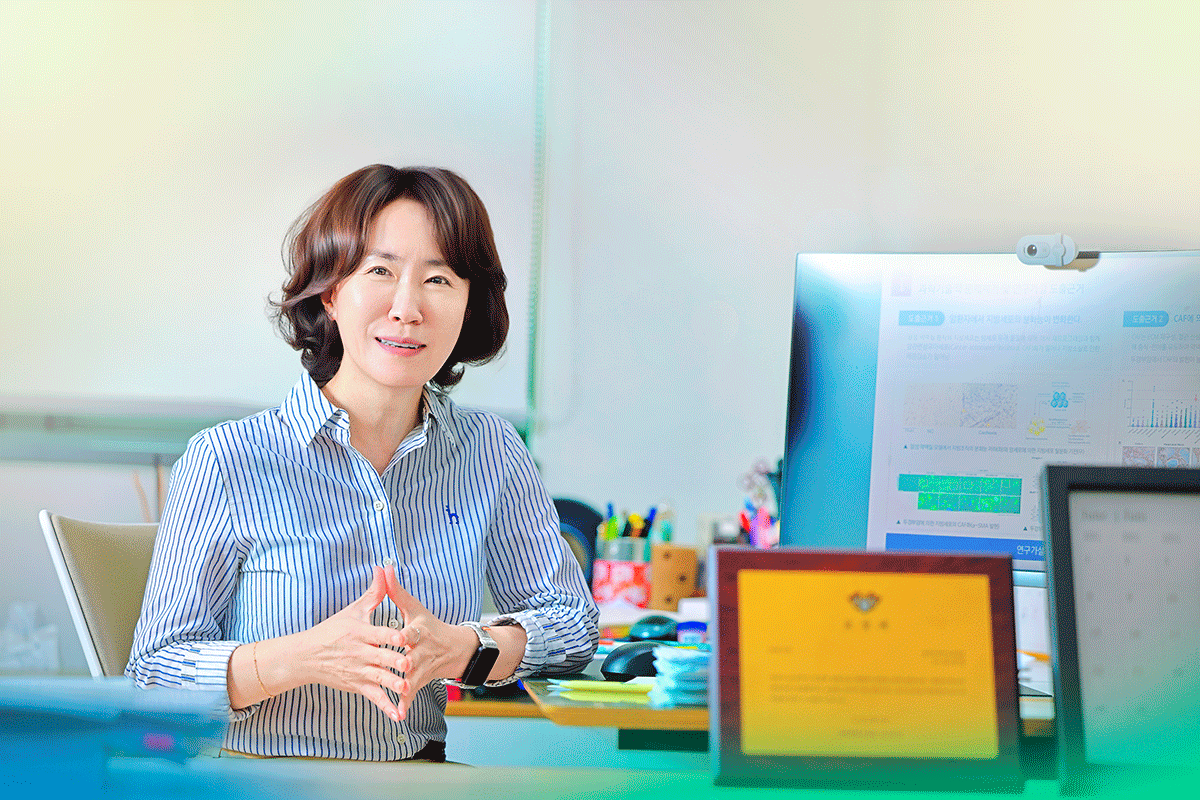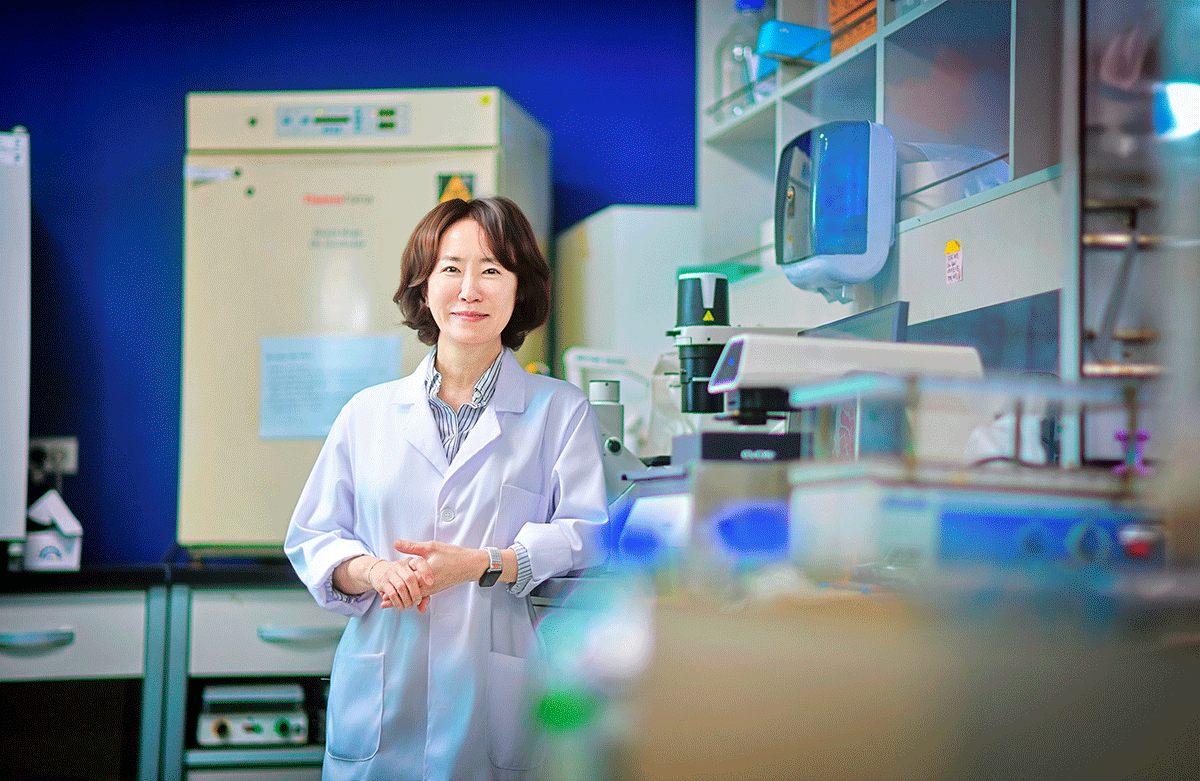header
News
Professor Jae-Young Um Selected for the Global Basic Research Laboratory Support Project
- WRITER 학무부총장실

Professor Um’s research team at the College of Korean Medicine has been selected for the 2025 Global Basic Research Laboratory (GBRL) Support Project, hosted by the Ministry of Science and ICT, through which she will develop treatment strategies to overcome cachexia
The team will receive approximately 1.5 billion KRW in research funding over three years to develop a treatment strategy for cachexia. The research topic is “Overcoming Cachexia through Modulation of Cancer-Related Adipose-Derived Fibroblasts.”
Cancer is not confined to a single body part but affects the entire body. Among its complications, cachexia is common in cancer patients, causing muscle and fat loss with debilitating symptoms. It is diagnosed when body weight loss exceeds 5%, at which point quality of life of the patient begins to decline sharply and treatment response becomes poor.

Plans to focus on head and neck cancers that are prone to cachexia and to develop tailored treatment strategies
Professor Um explained the unique nature of her research, saying, "While most cancer research tends to focus on the tumor cells themselves, our team is interested in how cancer affects the entire body." The research team focuses on how malignant tumors interact with surrounding cells and transform the body. They analyze, at the molecular level, how fat cells near tumors transform into cancer-associated fibroblasts (CAFs) and how this conversion contributes to cachexia, the severe wasting syndrome often seen in advanced cancer cases.
The team targets “head and neck cancer,” which refers to malignant tumors that can occur in the brain, eyes, face, nose, neck, mouth, larynx, pharynx, salivary glands, or thyroid glands. These tumors tend to grow quickly and carry a high risk of metastasis. Because of their location, they often interfere with eating and swallowing, increasing the likelihood of cachexia, as many patients also struggle to maintain adequate nutrition.
The research team will investigate the cancer microenvironment specific to head and neck cancer, focusing on how fibroblasts originating from adipocytes contribute to the development of cachexia. The goal is to design a treatment strategy that counteracts this effect, offering a pathway to prevent or mitigate cancer-related cachexia. As Professor Um explained, "Cachexia is common in head and neck cancer patients. Since the disease directly impairs the ability to eat, significant weight loss is a frequent outcome."
The research team proposes a new concept in cancer treatment, one that moves away from conventional methods focused on directly removing or destroying tumors. Instead, they aim to manipulate the cancer microenvironment, shaped by adipocytes and fibroblasts, to treat cachexia and foster conditions that inhibit tumor growth. Professor Um explains, "Ours is an indirect approach, restoring balance throughout the body in a way that resonates with the holistic principles of Korean medicine." Korean medicine is renowned for regulating the body as a whole, including nutritional status and energy metabolism. She plans to integrate Korean medicine with the latest in molecular biology to develop treatment strategies for a range of intractable diseases, including cachexia.
A molecular biologist by training, Professor Um has devoted nearly a decade to basic research on cachexia. Her work first began with adipocytes and gradually expanded to encompass white fat and the changes in adipose tissue associated with cancer. She remarked, "There is no definitive treatment for cachexia yet; the available treatment options are mainly palliative. It is a deeply challenging field with formidable methodological and practical obstacles, from modelling the complex metabolic changes in patients to translating findings into viable therapies. I was chosen for this research program only after seven attempts in basic research lab selections on the subject."

Global Basic Research Lab Program emphasizes internationalization capabilities, leveraging research networks
The Global Basic Research Lab Program, which selected Professor Um's research team, places a stronger emphasis on international collaboration than earlier basic research programs. This new shift in the program has opened up a significant new opportunity for the team, enabling them to expand the scope and impact of their work, as Professors Su Il Kim of the College of Medicine and Kwang Seok Ahn of the College of Korean Medicine are joining as co-researchers. The research team will also partner with leading institutions worldwide including the University of Toronto, the National University of Singapore, and the University of Texas MD Anderson Cancer Center.
Building on their established collaborative network, the research team will study fundamental biological mechanisms involving cancer, adipocytes, fibroblasts, and the epithelial-to-mesenchymal transition (EMT) of cancer cells. Their work will include precise molecular-level analyses of adipocyte changes, the formation and functional regulation of cancer associated fibroblasts (CAFs), and the induction of EMT.
The team will build a predictive model based on clinical data from actual cancer patients, followed by validation experiments in animal models. Their ultimate goal is to translate this model into a precision medicine-based treatment strategy with direct clinical applicability. To this end, the team will share equipment with international researchers to generate high-quality analytical datasets. Central to their collaborative framework is a student-researcher exchange program, which deepens expertise, fosters cross-disciplinary skills, and expands the global reach of their investigation.
Professor Um said, "With about ten years remaining until my retirement, this is the moment to delve more deeply into my research rather than broadening my scope. My goal is to clarify the proteins linked to adipocytes and the pathophysiological mechanics they drive." She concluded, "Eleven teams in the field of medicine and pharmacy were selected for this project. Nine of these projects are advanced, and our research team is among them. We see this as a springboard to undertake even larger endeavors and to demonstrate Kyung Hee’s global capabilities in academic convergence research."